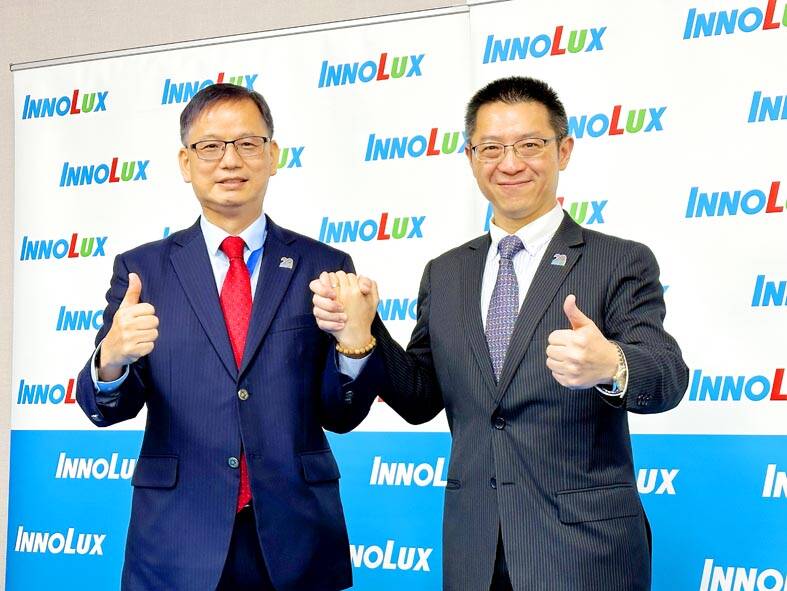LCD panel maker Innolux Corp (群創) yesterday reported an eight-quarter losing streak due to reduced working days from the Lunar New Year holidays and slack seasonality last quarter.
Losses widened to NT$4.1 billion (US$126 million) from NT$3.24 billion in the fourth quarter last year. Compared with the same period last year, losses have narrowed significantly from NT$7.77 billion.
Innolux’s average selling price dropped for the third consecutive quarter to US$263 per unit last quarter, sliding about 2.23 percent from US$269 in the fourth quarter last year.

Photo: Chen Mei-ying, Taipei Times
Innolux said the prices of TV panels climbed last quarter, benefiting from restocking demand as major sports games, including the Paris Olympics and UEFA Euro, are set to take place in the second half of this year.
Gross margin improved to 4.2 percent last quarter from 3.4 percent in the third quarter and minus- 7 percent in the first quarter of last year. Revenue shrank 5 percent quarter-on-quarter, but rose 11 percent year-on-year, to NT$50.49 billion in the first quarter.
“With the world’s three major sports events approaching, [TV vendors’] new product launches and China’s 618 promotion activities should stimulate panel demand during the second quarter,” it said yesterday, adding that factory utilization and production efficiency would be enhanced to match market changes and customer demand.
Large-sized panels, mostly used in TVs and computers, are expected to grow about 13 or 14 percent this quarter, while the average selling prices for those panels would climb about 5 percent sequentially this quarter, it said.
However, shipments of its small and medium-sized panels used in smartphones and cars are expected to drop about 7 or 8 percent on a quarterly basis, it added.
Innolux’s board of directors has approved a capital spending budget of NT$21 billion for this year, slightly lower than last year’s NT$22.5 billion.
It is accelerating its transformation efforts to expand into advanced chip packaging, auto displays and other new businesses beyond flat panels, Innolux said, adding that non-display products made up 28 percent of the company’s total revenue last year.
Innolux’s board of directors also approved a NT$10.89 billion capital reduction by canceling 1.089 billion shares, a 12 percent reduction of its total capital shares, it said, adding that the company would return NT$1.2 per share to shareholders.
After the latest adjustment, Innolux would have 7.99 billion in capital shares.

NEW IDENTITY: Known for its software, India has expanded into hardware, with its semiconductor industry growing from US$38bn in 2023 to US$45bn to US$50bn India on Saturday inaugurated its first semiconductor assembly and test facility, a milestone in the government’s push to reduce dependence on foreign chipmakers and stake a claim in a sector dominated by China. Indian Prime Minister Narendra Modi opened US firm Micron Technology Inc’s semiconductor assembly, test and packaging unit in his home state of Gujarat, hailing the “dawn of a new era” for India’s technology ambitions. “When young Indians look back in the future, they will see this decade as the turning point in our tech future,” Modi told the event, which was broadcast on his YouTube channel. The plant would convert

‘SEISMIC SHIFT’: The researcher forecast there would be about 1.1 billion mobile shipments this year, down from 1.26 billion the prior year and erasing years of gains The global smartphone market is expected to contract 12.9 percent this year due to the unprecedented memorychip shortage, marking “a crisis like no other,” researcher International Data Corp (IDC) said. The new forecast, a dramatic revision down from earlier estimates, gives the latest accounting of the ongoing memory crunch that is affecting every corner of the electronics industry. The demand for advanced memory to power artificial intelligence (AI) tasks has drained global supply until well into next year and jeopardizes the business model of many smartphone makers. IDC forecast about 1.1 billion mobile shipments this year, down from 1.26 billion the prior

People stand in a Pokemon store in Tokyo on Thursday. One of the world highest-grossing franchises is celebrated its 30th anniversary yesterday.

Zimbabwe’s ban on raw lithium exports is forcing Chinese miners to rethink their strategy, speeding up plans to process the metal locally instead of shipping it to China’s vast rechargeable battery industry. The country is Africa’s largest lithium producer and has one of the world’s largest reserves, according to the US Geological Survey (USGS). Zimbabwe already banned the export of lithium ore in 2022 and last year announced it would halt exports of lithium concentrates from January next year. However, on Wednesday it imposed the ban with immediate effect, leaving unclear what the lithium mining sector would do in the